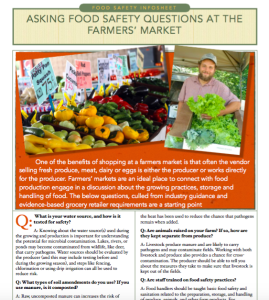Where I grew up (Port Hope, Ontario – that’s in Canada), there was a small tailgate farmers market Saturday mornings in the parking lot adjacent to Valu-Mart. My mom and I shopped there sometimes and I never really wondered whether the stuff was safe. I didn’t think a whole lot about food safety and regulation until years later. I figured that if someone could sell it, they must know what they are doing, and I didn’t have to worry about it.
Food safety is all about trust, and I had lots of it.
As a more mature food safety-focused shopper, I don’t care what size the farm is, where they are located geographically or what their production style is – I only want to know whether the person making what I’m eating can manage food safety risks or not. And whether they do it all the time.
When our group started working with farmers markets a few years ago we created a strong partnership with the North Carolina Department of Agriculture and Consumer Services. Together, with funding from the North Carolina Tobacco Trust Fund, we developed best practices and engaged with market managers and vendors through workshops and on-site visits. The focus was to help market folks manage food safety risks – and engage with the interested public around what they do to keep food safe.
The growing trend of farmers’ market shopping allows for direct engagement between producer and eater and when Kim Painter of USA Today asked me about questions I ask when I walk through vendor stalls I told her I go full food safety nerd and ask about handwashing (and other stuff).
Markets are subject to state and local food safety rules, but some practices – including the provision of hand-washing facilities for vendors – should be followed everywhere, says Benjamin Chapman, a food safety specialist at North Carolina State University. Chapman also asks whether workers have had food safety training and how equipment is kept clean. Finally, he asks about farming practices, including how farm water is tested for safety and how farms that raise animals keep animals and their waste out of fruit and vegetable fields. Illness outbreaks have been linked to foods sold at both grocery stores and farmers markets, he says. “I think there’s a perception that the products you would get at a farmers market are safer. But we don’t have that data.”
Click here to check out the asking questions at farmers’ markets infosheet we put together last year.

